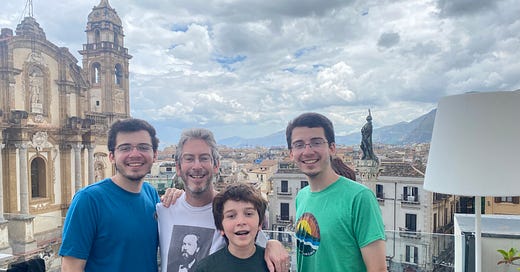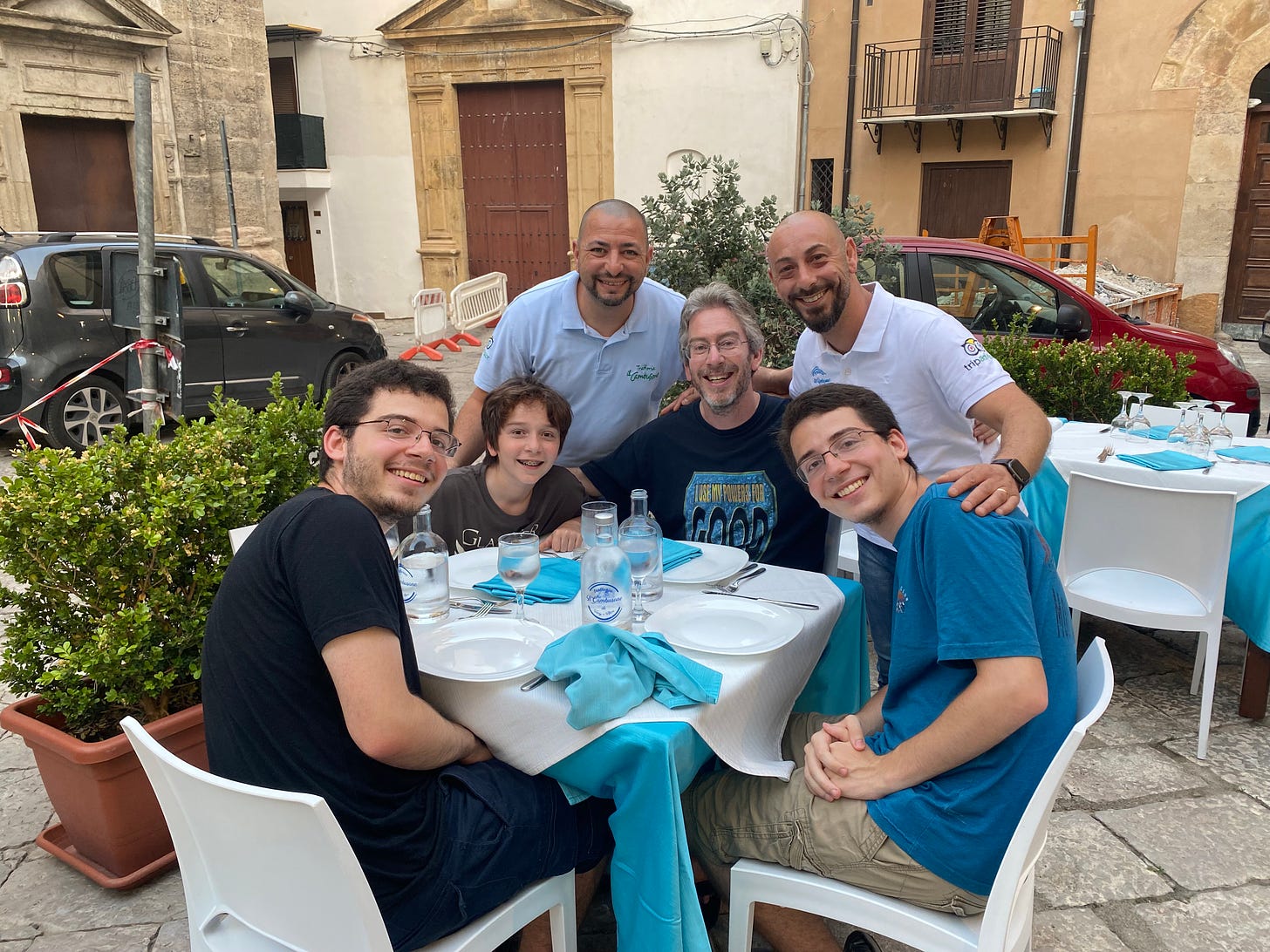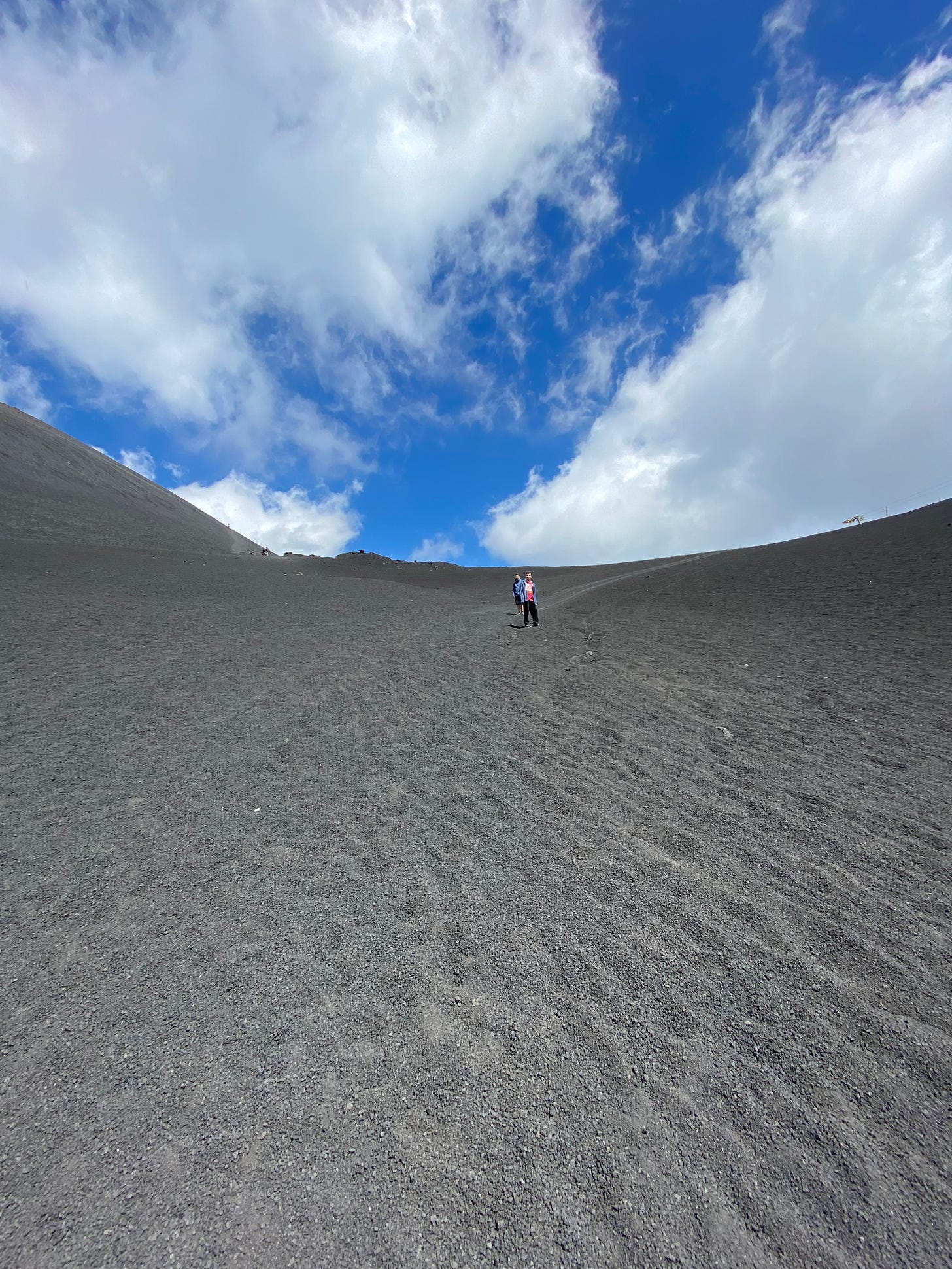I just returned from a seven-week tour of Italy. The first half was all in Sicily, where I was a visiting professor at the University of Palermo, teaching a class on the Economics of Immigration. In Palermo, I lived with my sons in the famed Vucciria district, commuting a little over a mile to the university. I saw almost every major sight around Palermo, including the famed Monreale and the far less famous Santa Rosalia near the summit of Monte Pellegrino. On one long weekend, we rented a car and toured most of the rest of the island, seeing Monte Etna, Sicacusa, Ortigia, Agrigento, the Valley of the Temples, and more. On the day we left the island, we took a train along the northern coast, and hung out in Messina for an hour waiting for the ferry to cross over to the mainland.
My top reflections on the Sicilian experience:
One could easily mistake Palermo for a Third World country. The homes are tiny. The vehicles are small, old, and poorly maintained. The streets are filthy. Graffiti covers the walls. The traffic is terrifying; motorists frequently drive on the wrong side of the road and ride motorcycles on the sidewalk.
Still, if you pay attention, there is one glaring sign that you’re in the First World: the multitudinous restaurants packed with locals. Despite all the symptoms of poverty, the average Palermitan routinely splurges on culinary luxury.
Outside of Palermo, most of the misleading signs of poverty vanish. The highways are well-maintained. The streets are tolerably clean. Graffiti is moderate. Abandoned rural homes are the main eyesore, though even they look good compared to abandoned rural American homes. Siracusa is nice, even miles away from the tourist areas.
When you see “crazy driving,” you have to weigh two competing hypotheses. One is that the danger is all-too-real. The other is that there’s a method to the madness. Traffic statistics surprisingly support the latter story. In 2020, there were only 161 deaths caused by traffic accidents in all of Sicily out of a population of 5M. That’s about one-fourth the U.S. rate. (In 2019, it was about one-third; traffic deaths fell during Covid in Italy even though they rose in the U.S.) True, Italians drive 55% fewer miles than Americans. But that still means that Sicily has a lower per-mile fatality rate. In the end, I liken Sicilian drivers to mountain goats. When you watch them leap from ledge to ledge, you naively expect them to die because you fail to account for their uncanny adaptation to their hazardous environment.
The Italian public sector closely matches cultural stereotypes of Italian laziness, disorganization, incompetence, and mindless bureaucracy - and the Sicilian public sector seems especially bad. (Though to be fair, the government trains ran on time everywhere we went). The Italian private sector, in contrast, stridently violates these cultural stereotypes. Sicilian restaurant workers are blatantly industrious: They toil with gusto, consistently delivering excellent food and swift service. All in a country where few tip.
Palermo had Uber, but it worked worse than anywhere else I’ve ever been. Two-thirds of the time, the app said, “No cars available.” Why didn’t Uber raise the price to eliminate the shortage, as it does elsewhere in the world?! This was especially aggravating because you don’t hail taxis in Italy. No taxi stand? You’re out of luck. Frequenting these taxi stands, by the way, gave me even more respect for Uber. As best as I can tell, the typical Italian taxi is idle 80% of the time. By excising this waste, Uber could slash prices in half and still increase driver incomes.
Researchers often blame Italian problems - especially southern Italian problems - on “low social capital.” To make this story fit, though, you have to sharply distinguish between for-profit business and everything else. For-profit business runs like clockwork in Sicily. Even literal hole-in-the-wall shops are well-managed. Yet otherwise, the society is dysfunctional. It’s not just government. The charities I saw seemed discombobulated, too. And while we met many friendly and welcoming Palermitans, and saw no serious crimes (though we did stumble on some tween graffiti artists plying their craft), the average level of discourteous and semi-criminal behavior astounded me. Hardly anyone cleans up after their pets, and smashing glass bottles is oddly popular. There was fresh broken glass on my street every morning.
My best explanation: “Culture is everything” stories are both deeply right and deeply wrong. When the price of bad behavior is negligible, the top negative southern Italian stereotypes are true-to-life. Yet culture remains malleable. Modest incentives drastically slash bad behavior. (Algebraically, bad behavior as a function of incentives has a high y-intercept and a steeply negative slope). While this is obvious in the for-profit sector, the same goes for smaller towns. When “everyone knows everyone,” courtesy pays - and Sicilians respond. To bring out their worst requires the anonymity of the big city.
Almost all Italians are cynical about government, and Palermitans are especially so. Yet demagogic socialist and nationalist parties dominate Italian politics. Why doesn’t anyone run on the no-nonsense platform of, “We all agree that Italian government works poorly and wastes massively, so let’s shrink government a lot”? According to my favorite Palermitan economist, the status quo rests on voters’ wishful thinking. When Italians hear about government growth, they hastily visualize themselves as happy parasites rather than unhappy hosts. They strangely assume they’ll come out ahead in what’s plainly a negative sum game.
Palermitans claim that everything bad about Palermo is even worse in Naples. Even a few Neapolitans bemusedly agreed. But at least as far as filth and traffic go, they’re just wrong.
Palermo is covered in anti-Mafia propaganda. Much of it looks permanent, but we got a bonus dose because we arrived in time for the 30th anniversary of the Mafia assassination of Judge Giovanni Falcone, their leading anti-Mafia martyr. At least for a few weeks, Falcone’s face was plastered all over Palermo. You also see walls of photos of Mafia victims, almost all government agents. Yet almost no one in Sicily had any first-hand knowledge of the Mafia. Some Palermitans claimed that almost every business pays “protection” to the Mafia; others claimed that almost none continue to do so. All guesswork, though.
Most of what I’ve read claims that organized crime is a substitute for regular police. Paying protection” isn’t just a shake-down; it allows people to get help when they’re engaged in illegal activities, or just fed-up with police apathy. Palermitans, however, adamantly insist that the Mafia is purely parasitical.
Caveat: Under cross-examination, the only Palermitan with first-hand knowledge admitted that the Mafia treated his father in the construction business better than corrupt local government officials had. When the Mafia pressured his father to hire someone, at least the guy showed up and did his job. When local officials pressured his father to hire someone, the guy only showed up on payday to collect his money. The same source told us that when the Mafia pressured his father to use their preferred vendor, the price stayed competitive.
Sicily’s top three strengths, in order: delicious and cheap food; jaw-dropping, otherworldly landscapes; and top-notch antiquities. Despite all the sporco, I could walk to a hundred great restaurants in ten minutes. Monte Pellegrino had such great views that I hiked it three times, ultimately discovering the cave church of Santa Rosalia.
The Greek ruins of Siracusa and Agrigento are supposed to be the best on Earth; while I have no good standard for comparison, they were great. Yet the crown jewel of Sicily, for me, was Monte Etna. You can see the smoke billowing out of the volcano from fifty miles away. When you exit the ski lift, it’s like landing on another planet. You hear the ground rumble. The volcano even erupted the day after we visited. Unreal!
P.S. Shout-outs to Sebastiano Bavetta, Paolo Di Betta, Fabrizio Simon, and Matteo and Elisa.
















A comment on taxis in Italy.
In order to be a taxi driver you need to get a licence in that particular city. The licence is yours and you can sell it to someone else that wants to enter the business.
So what happens is that people take huge loans to buy a taxi driver licence, and then they sell it when retiring. We are talking about something which is worth around hundreds of thousand euros in big cities.
So they do a lot of political lobbying to impose no competition. They do massive protests where they block the streets (imagine the wasted money they produce in a city like Rome!) and usually get what they want.
That t-shirt you're wearing on the first picture. Am I guessing right that it says: "Richter war richtig!"? ;-)